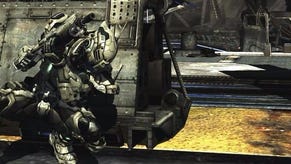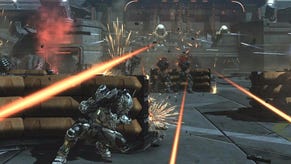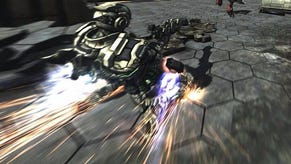Vanquish
Overcome.
Tap and hold the left trigger and Sam will lurch forward on his knees at high speed, skidding across the environment like an OutRun Ferrari mid-drift. Let go of the button and he'll spin his legs upwards like a break-dancer, landing in a combat-ready crouch in a single motion. This ability shrinks the game world, allowing you to cover vast distances in seconds, offering the chance to flank groups of enemies simply by sliding past their noses.
While in this high-speed slide it's possible to trigger the suit's bullet time mode, allowing you to pick out individual bullets and dodge between them. Bullet time is something we've seen before, but never with such grace as in Vanquish.
Both the high-speed dash and slow motion modes use up the suit's power gauge, which must be refilled after a few seconds. But the effect lasts long enough to offer near-constant use. Time rarely moves at a constant rate, instead slowing to a crawl before accelerating to fever pitch and back again, combat taking on a dreamlike quality as you dash from cover to cover before slowing the world around you to line up the crucial headshot.
These interactions are interesting in themselves, but in the context of Vanquish's wider world, they become thrilling. Enemy designs have all of the creativity of Treasure's best output: tortoise-like tanks that can click-clack into humanoid infantry; portable cover that sprouts legs and scuttles, crablike, across the battlefield before setting itself down in front of rows of soldiers; a tiny orb-headed sprite that can attract any metal debris around it to take on the form of a robotic tiger.
These are game-changing inventions; that they come from a Japanese developer that has never worked in the genre before is startling. Enemy behaviour, too, astounds in its fantastical believability. Shoot the legs from one robot and it will crawl at you. Not in a laboured, Hollywood death scene way, but with desperate lunging thrusts, its drill bit claws extended as it tries to skewer you with frantic, shocking jabs.
Combine this with Platinum's creativity in environmental, showboating thrills and the effect is spellbinding. In one level you attempt to scale a hill while gigantic pieces of masonry and concrete tumble towards you, kicking dust clouds up in the air. In another, you fight robots in a zero-gravity space station, debris and furniture floating all around within a 100-foot-high chamber, framed by stars seen through the giant windows beyond.
The engine is nothing short of breathtaking. Watching ten thousand missiles streak from the back of a bipedal robot, tracing light-lines upwards towards the ceiling before arcing over into a death fall towards your position, is a spectacle that doesn't grow old.
Vanquish is, however, a game primarily fuelled by spectacle. The story is sub-Kojima nonsense. Reduce the boss fights to their most basic components and the designs are decades old: you find the weak spot, exploit to temporarily reveal the tender core, and repeat the process.
But the riotous presentation makes each encounter feel as fresh as if it were conceived here for the very first time. As Sam launches into the air, the camera wheeling and diving about, you forgive even the intermittent QTE button-prompts that flash up on screen. The pay-offs are so magnificent that they justify these incongruous design crutches.
Devoid of any multiplayer content, Vanquish relies on its scoring mechanic to introduce longevity. Every action in the game is scored, while restarts from checkpoints incur point penalties to encourage careful progression.
While a 'God Hard' difficulty unlocks on completion, there's little incentive to keep returning to the game beyond climbing leaderboards and, at a push, trying to find the single hidden statue in each stage. This is perhaps the only area of the game which lags behind its Western counterparts, requiring the player to fully subscribe to score rivalry for any replay value.
But in almost every other regard, Vanquish is a trailblazer. It is a game of astounding creativity and polish, exhilarating on the ground in the moment-to-moment thrills of high-speed-to-slow-motion combat, as well as in its wider, twisting trajectory. Doubtless the best third-person shooter ever to come out of Japan, Vanquish builds on Western developers' triumphs to push the genre in new, interesting directions, shifting the balance of power, and cementing Shinji Mikami's position as one of the best directors working in videogames today.
































